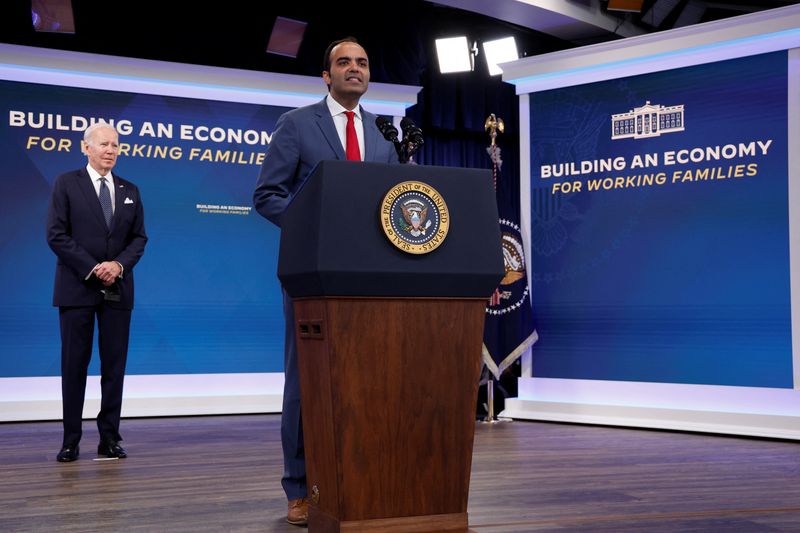By Nupur Anand and Tatiana Bautzer
(Reuters) - The recent failures of mid-size U.S. lenders show the need for more robust risk management at banks and fintechs, along with improved regulation, the head of the top consumer financial watchdog agency said on Tuesday.
Consumer Financial Protection Bureau Director Rohit Chopra told a gathering of retail bankers in Las Vegas that regulators were looking at liquidity, interest-rate risk management, capital frameworks, resolution planning and stress testing.
"It will be good for the industry to have some honest conversations with itself about what is the way for the regulatory framework to not create this type of risk," Chopra said.
As head of the CFPB, Chopra also sits on the board of the Federal Deposit Insurance Corporation, which took over failed Silicon Valley Bank earlier this month. He also serves on the Financial Stability Oversight Council, created in the wake of the 2008 crash.
"It was fast and furious," Chopra said of SVB's implosion. While the scramble by customers to move their funds has subsided, "there's no question it has been a dramatic movement of money," he said.
The fall of SVB is "a clear data point that $100 billion dollar banks can really cause a lot of systemic risk and ultimately contagion across the financial system," he said.
Lawmakers and lobbyists have sparred in recent days over who to blame for the collapse of Silicon Valley Bank. Some blame excessive risk-taking by bank leadership, a failure of regulatory supervision, or a 2018 rollback of key oversight provisions enacted as part of the 2010 Dodd-Frank Wall Street reform legislation.
Chopra, 41, is a protege of Democratic U.S. Senator Elizabeth Warren and a key figure in the Biden administration’s current class of progressive financial and economic regulators.
He is known for his deft policy messaging and firm calls for corporate accountability. In a three-year stint on the Federal Trade Commission, he established himself as an aggressive consumer advocate.
As member of the Democratic minority, he advocated for penalizing individual executives rather than simply collecting more fines.
U.S. President Joe Biden said on Tuesday he has done what is possible to address the banking crisis with available authorities but that it is "not over yet."
Chopra also told bankers he was concerned about the buildup of risk in so-called non-bank financial firms, such as fintechs or crypto companies, many of which are overseen by his agency.
"No one really believes that there is no non-bank that could offer the same type of contagion or same type of systemic effect," said Chopra. "A major disruption or failure of a large mortgage servicer, really gives me a nightmare."
Chopra's presence at the Consumer Bankers Association's annual confab was a rare opportunity for facetime with an industry where some attendees took umbrage with Chopra's style and public remarks, notably concerning the Biden administration's wider campaign against "junk fees."
Brian Johnson, a former CFPB during President Donald Trump's administration, told attendees that Chopra had been using the CFPB as a "bully pulpit" to drive change in industry behavior.

Chopra has tried to accelerate rule changes through public statements, as regulation changes and enforcement actions take longer to bring results, said Yolanda McGill, Zest AI vice president and former CFPB attorney.
Susan Seaman, a partner at Husch Blackwell LLP, clients were reaching out to review their fees. "People are taking proactive measures," she said. "Clients need to be ready to defend their policies."